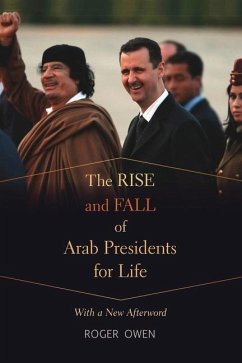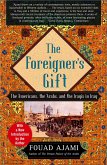Monarchical presidential regimes in the Arab world looked as though they would last indefinitely-until events in Tunisia and Egypt made clear their time was up. This is the first book to lay bare the dynamics of a governmental system that largely defined the Arab Middle East in the twentieth century, and the popular opposition they engendered.
Hinweis: Dieser Artikel kann nur an eine deutsche Lieferadresse ausgeliefert werden.
Hinweis: Dieser Artikel kann nur an eine deutsche Lieferadresse ausgeliefert werden.
Events have enhanced its timeliness, as it is a kind of obituary for the 'monarchical presidencies' of the Arab world. The book looks at the local differences and underlying similarities between the region's leaders... Owen's book provides a sharp look at the tyrannies the Arab spring is attempting to sweep away.
-- The Economist
Owen suggests that like Mafia dons, Arab presidents for life observed one another and learned from one another's experiences and argues that the Arab League has provided a loose supportive framework for their ambitions. Although the shadows of monarchical presidents will be cast long into the future, Owen is confident that the uprisings have brought their era to an end.
-- Foreign Affairs
A thoughtful and incisive evaluation of Arab political authoritarianism in all its components. Owen points out the many ways in which Arab Presidents and Kings imitated one another, with Presidential sons following-or attempting to follow-their fathers, and all relying on extensive security services and webs of patronage. His analysis of the personalization of power challenges recent efforts to distinguish Arab monarchies from their Presidential counterparts, and lays bare the internal logic of such personalized security states. As an historian, Owen is sensitive, and admirably transparent, about the limits of our knowledge about the inner workings of these regimes. But his brief discussions of each country effectively convey both the commonalities and differences across the cases. Owen's highly readable book serves as a fitting requiem for a system of rule which long seemed immovable, has now been exposed in all of its flawed brutality, but seems likely to adapt to new structural conditions rather than simply fade away.
-- Foreign Policy
In charting with care the rise of Arab presidents for life, Roger Owen has pioneered a new strand in the academic debate on authoritarianism in the Middle East and North Africa.
-- London Review of Books
Owen, one of the world's leading historians of the modern Middle East, examines the specific historical reasons that led to the rise of the authoritarian presidents in the post colonial era, but his real interest is how these individuals institutionalized power to become, in practice, dynastic monarchs... Among the host of issues Owen raises, of particular interest are why some Arab countries have gone this route and others not, similarities and differences between kings and presidents, the different kinds of dynastic presidents, comparative succession practices, and the question of Arab exceptionalism vis-à-vis other regions, such as central Africa or post-Soviet central Asia. His meditations on what to expect in the immediate future are judicious, insightful, and wise. This very timely book serves almost as a textbook on recent and current Arab politics.
-- Choice
No other book solely addresses this topic or examines it with the same scope or historical depth. Highly recommended for anyone interested in current foreign affairs or the history and future of modern Arab states.
-- Library Journal
Timely... Owen reveals how the Arab Spring demonstrates the inherent contradictions and weaknesses in the regimes, showing how their creation (and fall) resulted from modern political and economic circumstances... This comprehensive and balanced history illuminates the current upheaval.
-- Publishers Weekly
This book delivers, at precisely the right moment and in the right measure, the historical context needed for understanding the significance of the popular uprisings that are currently transforming the Arab world. In fluid and accessible prose, Roger Owen, the leading historian of the Middle East, demonstrates that the phenomenon of 'Arab presidents for life' is a product of modern historical circumstances, not a pre-determined outcome of the 'Arab mind,' a 'tribal' mentality, or the Islamic faith. The key to Owen's analysis is what he calls the 'demonstration effect': Arab leaders and regimes consciously borrowed from each other's internal security playbooks in order to solidify their power and prolong their rule. In so doing, they dug their own collective grave.
An accessible yet comprehensive review of the political history of the modern Middle East, made all the more relevant by the convulsions of the past year. Owen's dismantling of the 'Arab exceptionalism' argument, which has formed the basis of so many accounts of authoritarian power in the region, is historically and sociologically persuasive. He successfully explains how countries with very different histories have nonetheless produced political systems with such strong resemblances. Thoughtful, full of nuance, and mercifully free of jargon, Owen's writing carries the reader along at a terrific pace, providing both the grand sweep of history and the focused perspicacity of political analysis.
-- The Economist
Owen suggests that like Mafia dons, Arab presidents for life observed one another and learned from one another's experiences and argues that the Arab League has provided a loose supportive framework for their ambitions. Although the shadows of monarchical presidents will be cast long into the future, Owen is confident that the uprisings have brought their era to an end.
-- Foreign Affairs
A thoughtful and incisive evaluation of Arab political authoritarianism in all its components. Owen points out the many ways in which Arab Presidents and Kings imitated one another, with Presidential sons following-or attempting to follow-their fathers, and all relying on extensive security services and webs of patronage. His analysis of the personalization of power challenges recent efforts to distinguish Arab monarchies from their Presidential counterparts, and lays bare the internal logic of such personalized security states. As an historian, Owen is sensitive, and admirably transparent, about the limits of our knowledge about the inner workings of these regimes. But his brief discussions of each country effectively convey both the commonalities and differences across the cases. Owen's highly readable book serves as a fitting requiem for a system of rule which long seemed immovable, has now been exposed in all of its flawed brutality, but seems likely to adapt to new structural conditions rather than simply fade away.
-- Foreign Policy
In charting with care the rise of Arab presidents for life, Roger Owen has pioneered a new strand in the academic debate on authoritarianism in the Middle East and North Africa.
-- London Review of Books
Owen, one of the world's leading historians of the modern Middle East, examines the specific historical reasons that led to the rise of the authoritarian presidents in the post colonial era, but his real interest is how these individuals institutionalized power to become, in practice, dynastic monarchs... Among the host of issues Owen raises, of particular interest are why some Arab countries have gone this route and others not, similarities and differences between kings and presidents, the different kinds of dynastic presidents, comparative succession practices, and the question of Arab exceptionalism vis-à-vis other regions, such as central Africa or post-Soviet central Asia. His meditations on what to expect in the immediate future are judicious, insightful, and wise. This very timely book serves almost as a textbook on recent and current Arab politics.
-- Choice
No other book solely addresses this topic or examines it with the same scope or historical depth. Highly recommended for anyone interested in current foreign affairs or the history and future of modern Arab states.
-- Library Journal
Timely... Owen reveals how the Arab Spring demonstrates the inherent contradictions and weaknesses in the regimes, showing how their creation (and fall) resulted from modern political and economic circumstances... This comprehensive and balanced history illuminates the current upheaval.
-- Publishers Weekly
This book delivers, at precisely the right moment and in the right measure, the historical context needed for understanding the significance of the popular uprisings that are currently transforming the Arab world. In fluid and accessible prose, Roger Owen, the leading historian of the Middle East, demonstrates that the phenomenon of 'Arab presidents for life' is a product of modern historical circumstances, not a pre-determined outcome of the 'Arab mind,' a 'tribal' mentality, or the Islamic faith. The key to Owen's analysis is what he calls the 'demonstration effect': Arab leaders and regimes consciously borrowed from each other's internal security playbooks in order to solidify their power and prolong their rule. In so doing, they dug their own collective grave.
An accessible yet comprehensive review of the political history of the modern Middle East, made all the more relevant by the convulsions of the past year. Owen's dismantling of the 'Arab exceptionalism' argument, which has formed the basis of so many accounts of authoritarian power in the region, is historically and sociologically persuasive. He successfully explains how countries with very different histories have nonetheless produced political systems with such strong resemblances. Thoughtful, full of nuance, and mercifully free of jargon, Owen's writing carries the reader along at a terrific pace, providing both the grand sweep of history and the focused perspicacity of political analysis.








